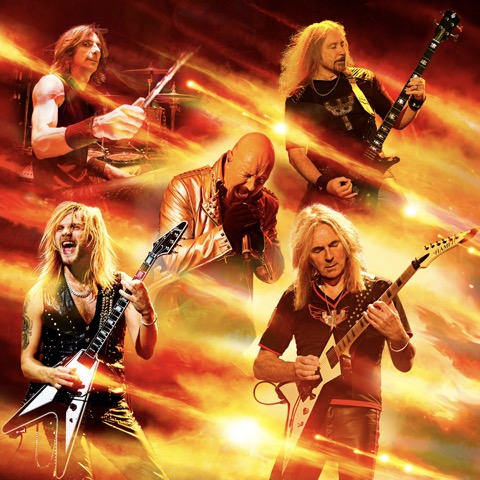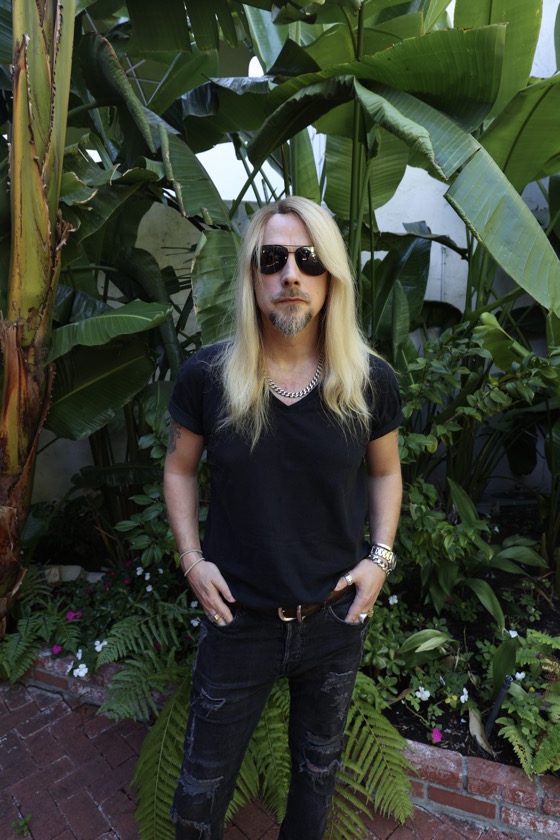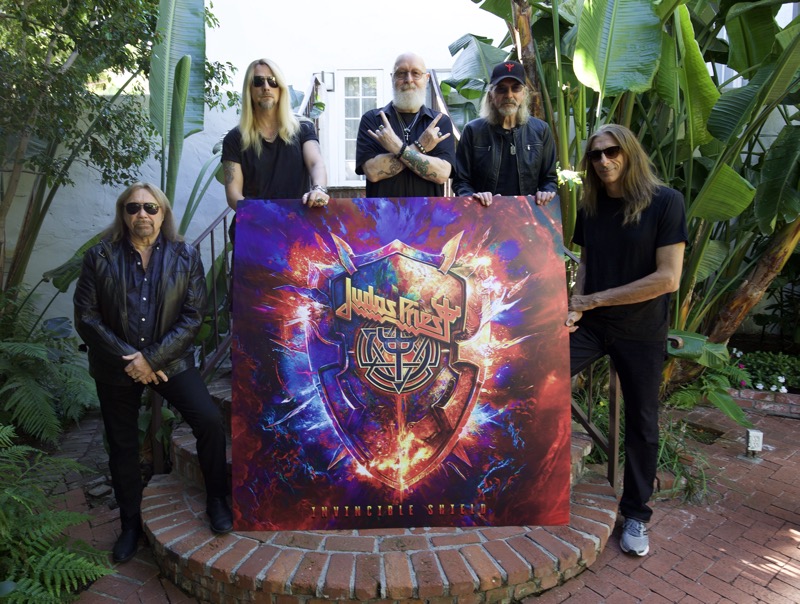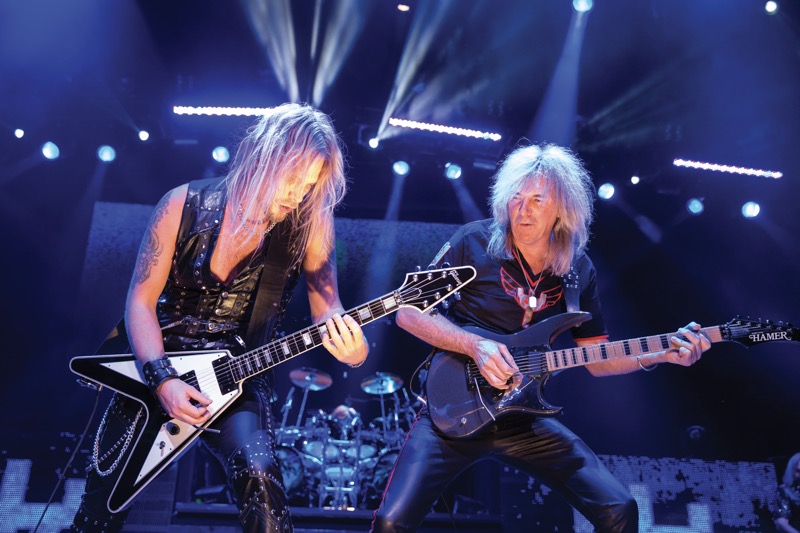Metal legend Judas Priest‘s new album Invincible Shield will be released on March 8, 2024. In a busy schedule, guitarist Richie Faulkner found time, exactly one month before the release date, to talk to us about the how and why of the new album.

Hi Richie, how are you doing?
Hi Patrick, thanks for asking. All is fine here. I hope it is the same on your side.
Thanks, it most definitely is. Are you not yet fed up with all the promotional talks, with having to answer more or less similar questions time and time again?
Hahaha. No, definitely not. It is fun to hear people’s responses and to hear what they are curious about. No problem at all.
Invincible Shield is album number nineteen for Judas Priest. What is Judas Priest looking for in a new album? I specifically ask you as a band, not the fans … a lot of them might just want a second British Steel or Painkiller. Is a release still a bit of a nerve-wrecking thing, as you might have an idea what the response will to it will be, but you never know for sure?
I work with a band and the band has been here, obviously, over 50 years. For me, when we get in the studio, we always try to do something that is – quote-unquote- better than before. How do we make it better? How do we write better songs, better performances, better lyrics, better guitar solos, better artwork, better production, and better setlist? You know what I mean? There’s always that drive to do something better. Otherwise, there’s no point you know? So, if you’re not going to do something better than before, then why do it? But I think there’s a big, there’s an enormous creative spirit in the band, you know? We love to create, we love to do new things, and set challenges for ourselves, and hopefully, we meet those challenges. We know where we have come from, I know where the band has come from. How can we go further down that road of heavy metal and do something a little bit different? That’s kind of the sentiment always going into whatever we do.
May I say that I think that the new album indeed turned out a bit different than what you’ve done before, but still has that so recognizable Judas Priest sound. For example, opener Panic Attack holds all the classic Judas Priest characteristics that a Judas Priest song should hold: Halford’s high, somewhat pinched vocals, a high tempo, and fierce riffs, with the solo work culminating in a dual twin guitar solo towards the end. And still, it has a fresh approach. Somehow, I feel that, and correct me if I’m wrong or if you see it differently, I think that Invincible Shield turns out more intense and more riff-driven than Firepower, your previous album.
I agree. I think so too. I think it is a little bit more complex than Firepower. There’s a few more twists and turns musically. There’s a lot of riffs in some of the songs, you know, they go off, they don’t stick to the path. They go off the path somewhere else and then bring the listener back at the end. And the character, I think you hit the nail on the head. The character of Priest is evident. It is Rob Halford, it is Glenn Tipton, Ian Hill. Scott Travis has been there for 30 years, over 30 years. It is the same band; the legacy is there. It’s in those guys, you know, that’s who they are. But then at the forefront, I think it’s Priest in 2024. This is where the band is now. And hopefully, we’ve pushed it a little bit further, somewhere different and can offer something different for fans to listen to and get their teeth into.

What’s the use of repeating another album which was already released, for example, 30 years ago?
So true. We don’t kind of set out to recreate anything. We just kind of do what we do. The other guys, they don’t say like, we want to do Screaming for Vengeance again or we want to do Painkiller again. It’s like, what have we got now? Where are we going now? What is this album shaping up to be? What does it sound like? What’s the character of the album? And move forward rather than looking back. And I think if we did an album that sounded like, for example, Screaming for Vengeance in 2024, I don’t think it would be appropriate. I think if we use the drum sound of Screaming for Vengeance, I don’t think it would apply to today. Priest have always been on the forefront. You know, they’ve been pioneers. I think to go back like that wouldn’t be a Priestly thing to do.
I might be wrong, but I just think it is always important to go forward rather than fall back into what you know. It is got to be relevant. It is got to sound relevant. I think the band is who the band is. You can hear there’s parts of the band’s history in everything the band does, I think. That’s how strong the character is. So, we don’t intentionally go out to recreate that. But I think it’s inherent in the band’s DNA that those references come out. Because it’s the same band. It is what they do and what they’ll always do. But somewhere along the line, you take it somewhere different to add to that tapestry of music that they’ve put out in the past.
What I also noticed in the album, what struck me was that it somehow holds a very natural flow to me. It’s not easy listening, but it listens easily to the album. There’s a very natural ongoing flow in the album.
I understand exactly what you mean. It’s not easy listening, but it’s easy to listen to. I like that summary. You’re right. It’s important, I think. Priest have always been about albums. I think our fans appreciate albums and the whole story that an album tells. Not in the way of a concept album, but just the dynamic from start to finish. And it’s the same with a setlist. When you put a live setlist together, it’s got to have an interesting dynamic that flows. It’s exciting in places, then brings it down to convey more emotion and then takes the energy up again. And when you go from a song like Crown of Horns, it fades out. It’s a mid-tempo, anthemic track. It fades out and then slams back in with As God Is My Witness. It gives the song more impact because of that dynamic. I think you’re right. It’s an important thing as an album to listen to the whole thing as it was put together. You have to put the order of the songs in an order that makes the most sense and is more beneficial to each song and the listener. It is something that we always take great care in doing to get the most from the album when you listen to it.

You could say that an album is also like a sort of composition. You have to put the songs in the right order and Crown of Horns is ideally placed. I mean: you come from Gates of Hell and then Crown of Horns has that tiny intense opening and then slips into the melodic thing. And at the end, the song fades away though it sounds like it could continue for another four or five minutes. And then As God Is My Witness comes in with its intensity. If Crown of Horns would, for example, have been the opener of the album, somehow, I feel it would have been misplaced and now it fits so well.
You can get it wrong you know. You have to take great care. As you said, putting the album list together is a composition in itself. If you get it wrong, it doesn’t flow properly and it’s jarring and it doesn’t make sense. So, you’re right.
What does writing an album look like for Judas Priest? Nowadays with so many possibilities online, do you share ideas through the internet after which each of you write or continue on certain riffs or something? Or do you still come together in a room? And I understood that Glenn also really contributed to all the songs. To what extent did his disease affect the writing process? Could you tell us a bit about that?
Well, to answer your first question in regards to how we write, all of the above, everything you said. So, we write bits and pieces on our own. We bring them together and see if anything fits. Or we write together in the studio. So, me, Glenn and Rob get in the studio with our ideas and we’ll put them to the other guys. I might have a couple of riffs and Glenn’s got a couple of riffs that fit that. And we put that together and you start working on a song. You might add bits to that together in the studio. So, all of those above that you mentioned, both individually and as a group, the three of us put those songs together.
And it was important to have Glenn as part of the writing and recording of this album. He is a vital, important part of Judas Priest. Not only his personality but the way he writes songs, and the way he hears things. He is very unique. He is a very unique player. And the way he constructs music. And that’s what’s made Priest one of the reasons it’s been so unique over the last 50 years. Every band member, Glenn, Rob, Ian, Scott, KK Downing, and the other guys, Les Binks, Dave Holland, all those guys are incredibly unique. But Glenn, as a guitar player, you really know it’s Glenn.
So even the little turnarounds and backwards and forwards with the little embellishments and stuff. Glenn has a lot of those ideas that are unique. So, it was important for us, and maybe to him as well, to be included. And the overarching thing was if he could play the riff or he could play the idea that day or if he could record that day, he would. And if he couldn’t, then I would take on that role. And I mean, for me, that’s what you do. If part of the group is having challenges, you stand up for them, you stand in and you do what you can to help them. But he would bring songs to the table like Escape from Reality, Sons of Thunder and he played with us on Giants in the Sky. So, he had an input into the record. I think it was important for him to have input for various reasons, as I said. But if he couldn’t do it, then I would take on the role and play those guitars as well. That’s how we approached it, really. Yeah, because you’re a unity.

Of course, you’re five individuals. But in the end, you’re a band together. And if you can’t stand in for each other, then what’s the use of being together
Absolutely. And I think everyone, you know, all the fans have been sympathetic and understanding to Glenn’s condition. And I think they understand that. If Glenn couldn’t do it or he couldn’t play that part, I think they understand. They’re with Glenn as well. And they understand and they’re sympathetic. And I think they’ll support him all the way. If Glenn Tipton was only on two, three percent, I don’t know, I’m making it up, but three percent of the record, that’s great. You know, if he was on, you know what I mean? Whatever Glenn Tipton can do, I’m for it. And I think the fans are for it too.
I think so too. This is the first album you will release and have written music for after you became a parent. It’s a huge cliche, but such live events change people, of course. Can you indeed say that being a parent has affected the way you look at life or maybe also writing your music? Or am I just talking nonsense now?
Well, maybe that’s where Panic Attack comes from. Hahaha. I don’t know. I mean, it does affect your life. You know, obviously, it’s a massive thing. It’s a beautiful thing to have a child. I think the intensity of writing metal and heavy riffs stays the same. And I’m not a big lyric writer either, so I’m not going to start writing lyrics about parental things or anything like that. But it changes your life in other ways, as you know. We always try to take her to Europe or we take her around the States when we’re on tour. She travels with us sometimes and she gets that education of being on the road, experiencing other cultures and other people and different lives and stuff like that. So, we try and keep her a part of it as much as we can and she loves it. She loves the music. She loves the drums. She loves Scott’s drums. So, yeah, we might have a drummer, a new budding drummer in the family. Hahaha. But, again, we try and give her that experience, that life experience at this age, that she’s not going to get anywhere else. So, we try to keep her a part of it and she loves it.

Most wonderful, Richie. When I’m not mistaken, I think Rob’s count is now at 72. It’s remarkable that he gets the ability to still deliver such strong vocals. I’m impressed by what he achieves on the album. Maybe it’s not a question you can answer, but do you know where he gets that power and fragility from?
He is outstanding. He is 72 years old and that is who he is, man. That’s what he has always done. And that’s who he is. He is Rob Halford. I don’t know how his voice has held up this long, physically as an instrument. Obviously, he has made changes over the years and he’s learned to utilize different parts of his voice in different areas. I think that’s just part of what’s made him such a diverse singer. And the band is such a diverse metal band that it goes from one atmosphere to the next. We spoke about Crown of Horns going into As God Is My Witness, Serpent and the King, even Painkiller, Turbo, Beyond the Realms of Death and Take These Chains. They’re vastly different. The dynamic is so different and he’s the same. So he has got this incredible instrument that he’s learned over the years to nurture and use in stronger places to make it more impactful. That is who he is, man. I think that’s how he still does it. It’s just who he is. And he was kind of born with that. And it’s a gift. That’s what he does.
It’s so nice to hear. There are some older singers as well who used to have great voices but are slowly lacking in certain parts. But I can’t find it in Rob’s vocals.
That’s very pleasing to hear. I think he’s fortunate in the way that diversity that I was talking about. He can pull back with his song and that gives him the space to really hit it hard in the next one, if you know what I mean. So, when you’re playing live, he can utilize that different voice style. And we put the set around that as well. We’re very conscious of that when we put a set together. What’s more economical for Rob in the way that he sings the whole set. Like we were talking about the album. The dynamic ebbs and flows through the set. And he utilizes his voice to the best way because of the way we construct the set. Because it’s just an amazing instrument. You know, Priest would be quite different if it didn’t have that instrument in it. He is a unique, he is a one-off. He is literally a treasure.
Well, I could talk a lot longer, but I see time is almost running out. So, let’s put an end to it. Thank you for your time and openness. I hope everything was to your liking.
This talk was absolutely fine. Yeah, it was a pleasure. Thanks for taking the time to talk about our new album. You guys are in Holland, correct? I think we are coming down in a couple of months (editorial: 10th of June in Amsterdam). Hope to see you then. Thanks for your time, man. Hopefully see you soon on the road and take care for now.
Links:











